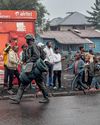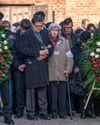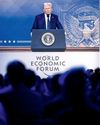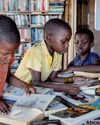
THE MEDIA ARE ALIVE with crumbling firewalls (Brandmauer) in Germany. State elections in Thuringia have delivered the first win for the extreme right since 1945 in the region where the Nazis first entered regional power in 1929, and on the date Adolf Hitler invaded Poland in 1939.
"The east will do it!" The Alternative für Deutschland's (AfD) campaign mixed the usual right-populist themes with the suggestion that the east is where the real Germany resists the liberal horrors of multiculturalism and windpower.
A panic-stricken commentator announces that "there's only one way to keep Germany's far-right AfD at bay. Address the concerns it exploits" with "constructive debate on sensitive issues".
Other writers are horrified that Germany's centreright Christian Democratic Union (CDU) is suddenly concentrating its firepower on, of all people, the Greens. Are Germany's Tories copying all those former centrist conservatives of recent years (take a bow, Boris Johnson) and adopting the attack tactics of rightwing populists? That's the firewall that really matters, and if that goes...
Some facts. At the last Thuringian election in 2019, the AfD won 23.4% of the vote. This year, it won 32.8%. Consider those five years: Covid, the Ukraine war and the energy crisis caused by Germany's blind dependence on Vladimir Putin's gas. A country led by a fractious coalition under a chancellor whose party got less than 26%, and who seems to do whatever he does (if anything) late and unwillingly. Five years of an ideal breeding ground for anti-"system" populism and conspiracy theories - at the end of which the AfD has managed to convince less than 10% more voters in its strongest state.
And in Germany, of course, being the biggest single party doesn't mean you've "won", because your seats are in proportion to your vote. Without an absolute majority, all you win is first dibs at a coalition.
This story is from the September 13, 2024 edition of The Guardian Weekly.
Start your 7-day Magzter GOLD free trial to access thousands of curated premium stories, and 9,000+ magazines and newspapers.
Already a subscriber ? Sign In
This story is from the September 13, 2024 edition of The Guardian Weekly.
Start your 7-day Magzter GOLD free trial to access thousands of curated premium stories, and 9,000+ magazines and newspapers.
Already a subscriber? Sign In

What is DEI and why is Trump waging war against it?
When American voters headed to the ballot box in November, opinion polls suggested the cost of living, immigration and reproductive rights ranked among their biggest concerns.

Who are M23 rebels and why is there fighting in eastern DRC?
The armed group M23 and Rwandan soldiers entered the centre of Goma last Sunday after weeks of advancing on the main city in the Democratic Republic of the Congo's North Kivu province.

Aid distribution What Israel's ban on Unrwa may mean for Palestinians
Israel this week insisted it would not back down over its plan to close the Gaza operations of the United Nations Relief and Works Agency for Palestine Refugees (Unrwa), even though critics said the move would jeopardise urgent humanitarian aid efforts.

Anti-terror strategy failed to stop a killer
Southport attacker's lack of coherent ideology meant the Prevent scheme did not see him as a potential risk, exposing the need for reform
Last writes
Handwriting is disappearing - we are far more likely to use our hands to type or swipe than pick up a pen. But in the process are we in danger of losing cognitive skills, sensory experience and a connection to history?

I just want to hug those girls' Bittersweet joy and relief as freed soldiers return home
Nineteen-year-old Naama Levy became an indelible symbol of Hamas’s 7 October 2023 attack on Israel.

Eighty years after the liberation of Auschwitz, survivors call for courage amid the rise of hatred and antisemitism 'We must avoid the mistakes of the 1930s'
On a day of startling blue skies, Auschwitz survivors stood before princes and presidents on Monday to remind the world, perhaps for the final time, of the horrors they suffered there during one of the darkest moments of human history.

Davos lessons Trump's return heralds new era of harsh global competition
In the heady mountain air of Davos last week, away from the parties and the backslapping tech bros, another, more beleaguered crew touted their wares: the multilateralists.

Can the continent's publishing industry turn a page?
Tsitsi Dangarembga's Nervous Conditions, a novel about growing up in colonial Zimbabwe, is one of the most important works of 20th-century African literature and features on university curriculums across the UK.

Trump has arrived with abang-but can he follow through?
Little more than a week ago, Stewart Rhodes was serving an 18-year prison sentence for seditious conspiracy over his role in a deadly attack on the US Capitol.